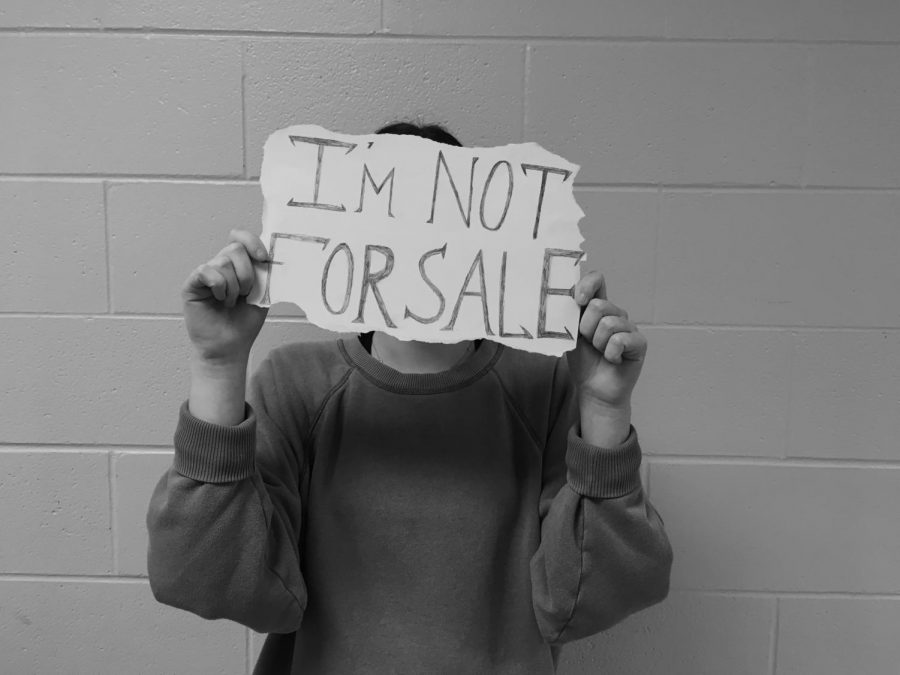Society’s Hidden Epidemic: Human Trafficking
A student stands holding a sign saying “I’m not for sale” to symbolize the human trafficking issue plaguing society
Human trafficking has become more prevalent in today’s society, consuming communities near and far. Despite this frequency, many are naive to such occurrences.
To bring attention to this widespread issue, January is observed as National Slavery and Human Trafficking Prevention Month. This month is dedicated to recognizing the survivors and current victims of human trafficking.
Often considered as modern-day slavery, human trafficking involves coercing others to engage in commercial sex acts, forcing others into acts of labor, or committing sexual exploitation. According to humantraffickinghotline.org, there are an estimated 40.3 million victims of human trafficking across the globe, affecting every country in the world and all 50 states.
It is easy to watch such tragedies from afar, offer condolences, and try to understand such unfathomable events. However, it is more challenging to imagine this happening in your own town, to people in your community, or even to you.
Rebecca Bender, a human trafficking survivor and award-winning speaker, had a similar mindset as she ventured out from her hometown. She fell in love with a man who accepted her and her child as his own and moved her life to Las Vegas to continue the relationship. What seemed like the perfect life at first quickly began to end. After relocating to Las Vegas, Bender was forced into human trafficking by the man who seemed like nothing but a promising future. She was sold between three traffickers for about six years before the home where her, her daughter, and three other women were held was raided and Bender was physically free from the enslavement of her trafficker.
Sharing her story on thorn.org, Bender stated, “. . . trafficking is not always abductions. It’s a slow, gradual expansion of boundaries and an increase of trust.”
Bender’s experience is representative of how versatile human trafficking can be. This, in turn, makes identifying such cases troublesome. Though human trafficking can appear in various manners, recognizing common warning signs could be someone’s ticket to safety.
Warning signs may include individuals using scripted responses in social situations, lacking official identification or documentation, avoiding authority figures and law enforcement, working excessively long hours, living at a place of employment, or showing signs of physical abuse according to state.gov.
If an individual has exhibited one or more of these warning signs or you suspect someone may be in trouble, knowing how to respond to the situation will allow you to better assist a victim. Fear of traffickers and law enforcement often prevents victims from reaching out for help; therefore, those who have been trafficked will not likely be forthcoming with sharing so.
As stated on state.gov, asking simple questions such as, “Where do you sleep and eat?” and “Have you been hurt or threatened?” may extract more information from a potential victim. If you are in contact with someone in a trafficking situation, alert law enforcement or the human trafficking hotline immediately.
Stopping this tribulation from ever occurring is unfeasible, but being aware of your surroundings and taking safety tips into consideration is a step towards prevention. Actions as simple as creating a safe word between you and your friends and family and avoiding traveling alone at night may ensure your safety.
This enslavement of citizens knows no race, religion, age, or gender; anyone is capable of becoming a victim. If you or someone you know may be a victim of human trafficking, contact the National Human Trafficking Hotline at 1 (888) 373-7888.

Ainsley is a senior in her second year of journalism and is a Staff Writer and Editor. Other than journalism, she is involved in NHS, VAB, The Cappies, and is a Student Body Officer. Outside of school, you can almost always find her at a nearby coffee shop with her friends. She is excited to expand her knowledge of writing and share this passion with others.






